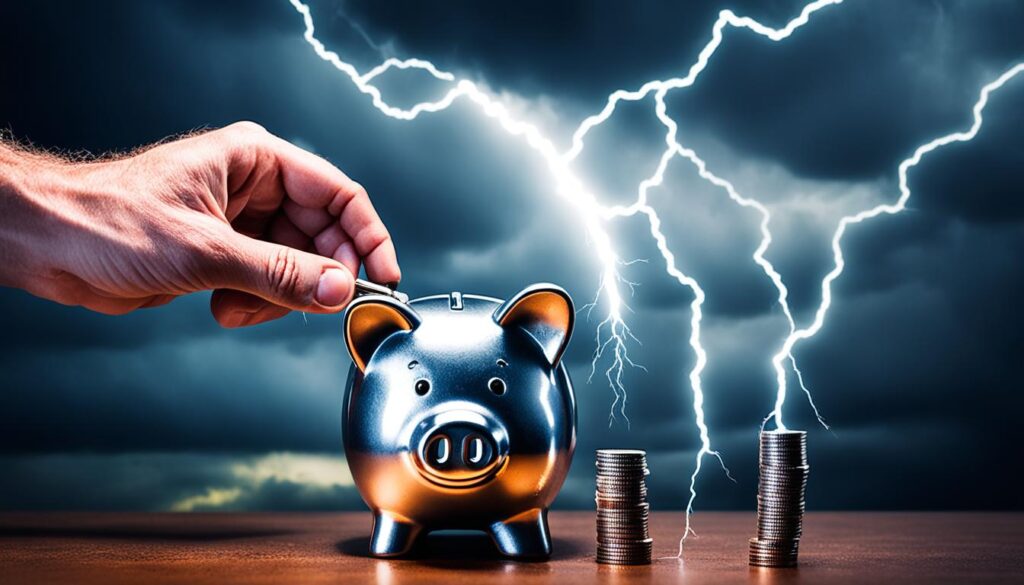Did you know there’s a 64 percent chance that the U.S. economy will experience a contraction by the end of 20231? Understanding how to implement a recession-proof financial plan is essential in today’s unpredictable economic climate. With rising inflation and historical trends pointing towards increased unemployment during economic downturns, preparations are more critical than ever2. The proactive steps you take now—such as stringent financial planning, budgeting, and creating an emergency fund—can significantly mitigate the personal financial impacts associated with recessions. By focusing on these key priorities, you can enhance your financial stability and confidence when facing uncertain times.
Key Takeaways
- Recessions are likely, with significant economic contractions predicted.
- Building an emergency fund can provide financial security during downturns.
- Identifying essential versus discretionary spending is fundamental to budgeting.
- Paying down debt enhances financial flexibility and reduces stress.
- Advancing your skills and education may improve job security during recessions.
Understanding the Impact of Recessions on Personal Finances
Recessions significantly affect personal finance during recession as they lead to substantial declines in economic activity. Employees often face job insecurities, and asset values typically drop, which creates a difficult financial environment. For instance, economists surveyed by the Wall Street Journal predict a 39% chance of a recession occurring within the next year3. In recent downturns, many individuals grappled with losses in their retirement accounts as companies reduced operational costs4. This economic slowdown effects lead to consumers tightening their budgets, prompting essential shifts in how they manage their living expenses.

A crucial consideration during these challenging times is the impact on health insurance. With over half of the U.S. population relying on employer-based health insurance, job loss can jeopardize crucial health coverage3. Individuals must recognize these patterns early, enabling them to adopt proactive financial measures. Practical approaches include establishing budgets and identifying areas to trim unnecessary expenses.
A structured response to the recession impact can bolster a household’s financial health. People are advised to focus on paying down existing debts while maintaining a good credit score3. This financial discipline will help in weathering the current economic slowdown effects and better preparing individuals for potential future recessions.
Financial Planning During a Recession: What to Focus On
Understanding financial planning during a recession is crucial for maintaining stability in uncertain times. The first step involves evaluating your current financial situation. Take a thorough inventory of your income sources, assets, and liabilities to gauge your financial health. Individuals should compile a list of monthly bills and current account balances, which offers a clearer financial picture amid economic downturns. This process reveals potential areas for minimizing spending and adjusting financial priorities in a recession5.
Evaluating Your Current Financial Situation
Conducting a complete assessment of your financial standing serves as the foundation for making informed decisions. Regularly monitoring your financial situation helps anticipate potential challenges and prepares you for upcoming hardships. With unemployment rates traditionally rising during recessions, staying ahead is essential5. For many, it may mean delaying major purchases and focusing on debt repayment while increasing savings to navigate through rough patches6.
Identifying Discretionary vs. Essential Spending
An effective strategy during a financial downturn involves classifying your expenses into discretionary vs. essential spending. Essential spending includes necessary bills such as housing, utilities, and food—expenses that one cannot avoid. Discretionary spending encompasses non-essentials like dining out, entertainment, and luxury items. Understanding this distinction can guide budget adjustments to prioritize essential expenses. By cutting down on discretionary spending, individuals can allocate more resources toward building an emergency fund, ideally covering three to six months of living expenses6. This practice reinforces financial resilience during tough economic times.

Building an Emergency Fund for Financial Stability
Establishing an emergency fund is vital for ensuring financial stability in a recession. An effective emergency savings strategy involves saving enough to cover three to six months of living expenses. This safety net becomes particularly beneficial in times of economic uncertainty and job market instability, as it provides a cushion against unexpected expenses.
How Much to Save
Experts recommend aiming for a minimum of three months’ worth of living expenses in a high-yield savings account to support financial stability in a recession7. A more robust goal would be to save enough to cover six months of essential expenses. This aligns well with research indicating that 36% of Americans would not be able to cover a $400 emergency expense8. By prioritizing saving this amount, individuals can greatly enhance their financial resilience and preparedness for any downturn.
Strategies for Building Your Fund
To effectively build an emergency fund, consider the following emergency savings strategies:
- Automate Your Savings: Set up automatic transfers to your savings account after each paycheck to consistently contribute towards your emergency fund.
- Adjust Your Budget: Review and scale back on non-essential expenses to redirect those funds into your savings.
- Start Small: Even starting with a goal of saving $1,000 can help build the habit of saving and contribute to larger financial goals.
- Multiple Income Streams: Consider creating a side hustle or freelancing to supplement your primary income, thereby increasing your savings potential.
Creating and Adhering to a Monthly Budget
Establishing a monthly budget is essential for fostering financial health, especially during unpredictable economic conditions. Implementing effective monthly budgeting strategies can provide a clear pathway to managing finances while ensuring you are prepared for potential challenges. The recommended framework of allocating 50% for necessities, 30% for discretionary spending, and 20% for savings becomes even more critical as nearly 7 in 10 Americans express worry about the potential for a recession before the end of 20239. This structure aids in keeping spending in check during periods of uncertainty.
Budgeting Basics for Financial Confidence
Budgeting basics include defining your income and expenses, allowing you to get a comprehensive view of your financial situation. With the recent increase in interest rates targeting 4.75-5 percent9, having a balanced budget becomes vital. Regularly revisiting and adjusting your budget ensures you remain aligned with your financial goals while accommodating shifts in your economic landscape10. As individuals streamline their budgets, they may find peace of mind and bolster their confidence in navigating financial obligations.
Adjusting Your Budget During Economic Downturns
When faced with economic downturns, it is prudent to re-evaluate your monthly budget. Paying closer attention to essentials and cutting back on non-essential spending, such as dining out or entertainment, can protect your finances10. Given that 68% of people fear losing the ability to cover living expenses if they lose their primary source of income9, maintaining a flexible budget allows for the necessary adjustments to safeguard your financial wellbeing during challenging times. Ultimately, establishing and adhering to a thoughtful budget can significantly enhance resilience in the face of economic uncertainties.
FAQ
What is a recession-proof financial plan?
How can I prepare for a recession financially?
What are some effective recession budgeting tips?
How much should I save in my emergency fund during a recession?
What are some strategies for building an emergency fund?
FAQ
What is a recession-proof financial plan?
A recession-proof financial plan involves strategies that enhance financial stability during economic downturns. This includes creating a solid budget, reducing unnecessary expenses, building an emergency fund, and prioritizing essential spending over discretionary items.
How can I prepare for a recession financially?
To prepare for a recession financially, evaluate your current financial situation, identify essential vs. discretionary spending, establish a robust emergency fund, and create a detailed monthly budget. These proactive steps can help manage your finances effectively during challenging economic times.
What are some effective recession budgeting tips?
Effective recession budgeting tips include tracking all income sources and expenses, allocating 50% of your income to necessities, 30% to wants, and 20% to savings. Regularly revisiting and adjusting your budget is also essential for adapting to changes in your financial situation.
How much should I save in my emergency fund during a recession?
Experts recommend saving enough to cover at least six to nine months of living expenses in your emergency fund. This amount can provide a financial safety net during periods of job market uncertainty or reduced income.
What are some strategies for building an emergency fund?
Strategies for building an emergency fund include automating savings from each paycheck, temporarily reducing non-essential expenses, and setting small, achievable savings goals to develop a consistent saving habit. Even starting with a modest goal, such as
FAQ
What is a recession-proof financial plan?
A recession-proof financial plan involves strategies that enhance financial stability during economic downturns. This includes creating a solid budget, reducing unnecessary expenses, building an emergency fund, and prioritizing essential spending over discretionary items.
How can I prepare for a recession financially?
To prepare for a recession financially, evaluate your current financial situation, identify essential vs. discretionary spending, establish a robust emergency fund, and create a detailed monthly budget. These proactive steps can help manage your finances effectively during challenging economic times.
What are some effective recession budgeting tips?
Effective recession budgeting tips include tracking all income sources and expenses, allocating 50% of your income to necessities, 30% to wants, and 20% to savings. Regularly revisiting and adjusting your budget is also essential for adapting to changes in your financial situation.
How much should I save in my emergency fund during a recession?
Experts recommend saving enough to cover at least six to nine months of living expenses in your emergency fund. This amount can provide a financial safety net during periods of job market uncertainty or reduced income.
What are some strategies for building an emergency fund?
Strategies for building an emergency fund include automating savings from each paycheck, temporarily reducing non-essential expenses, and setting small, achievable savings goals to develop a consistent saving habit. Even starting with a modest goal, such as $1,000, can build momentum.
How does a recession impact personal finances?
A recession can lead to job insecurity, reduced asset values, and short-term losses in retirement accounts. These factors necessitate tighter budgets and re-evaluated financial priorities, affecting individuals’ ability to manage living expenses effectively.
What financial priorities should I focus on during a recession?
Financial priorities during a recession should include maintaining a balanced budget, prioritizing essential expenses, ensuring timely payment of bills, and building an emergency fund. Adjusting your savings and spending habits in response to economic conditions is also critical.
Can I invest during a recession?
Yes, it is possible to invest during a recession, but it requires careful consideration and a strategy that aligns with your financial goals. Focus on recession-resistant investments, dollar-cost averaging, and maintaining a long-term perspective while being mindful of market volatility.
,000, can build momentum.
How does a recession impact personal finances?
A recession can lead to job insecurity, reduced asset values, and short-term losses in retirement accounts. These factors necessitate tighter budgets and re-evaluated financial priorities, affecting individuals’ ability to manage living expenses effectively.
What financial priorities should I focus on during a recession?
Financial priorities during a recession should include maintaining a balanced budget, prioritizing essential expenses, ensuring timely payment of bills, and building an emergency fund. Adjusting your savings and spending habits in response to economic conditions is also critical.
Can I invest during a recession?
Yes, it is possible to invest during a recession, but it requires careful consideration and a strategy that aligns with your financial goals. Focus on recession-resistant investments, dollar-cost averaging, and maintaining a long-term perspective while being mindful of market volatility.
How does a recession impact personal finances?
What financial priorities should I focus on during a recession?
Can I invest during a recession?
Source Links
- https://www.truist.com/money-mindset/principles/budgeting-by-values/how-to-prepare-for-a-recession
- https://www.businessinsider.com/prepare-money-for-recession-2024-5
- https://www.wsj.com/buyside/personal-finance/financial-tips/how-to-prepare-for-a-recession
- https://www.investopedia.com/articles/economics/08/recession-affecting-business.asp
- https://www.equifax.com/personal/education/personal-finance/articles/-/learn/five-ways-to-prepare-for-a-recession/
- https://www.hanoverparkbank.com/articles/2023/03/what-is-a-recession-and-how-could-one-affect-your-finances.html
- https://www.forbes.com/sites/truetamplin/2024/07/06/15-ways-to-strengthen-your-finances-ahead-of-a-possible-us-recession/
- https://www.traviscu.org/my-life/blogs/financial-wellness/march-2023/how-to-recession-proof-your-finances/
- https://www.bankrate.com/banking/federal-reserve/how-to-prepare-for-a-recession/
- https://www.morganstanley.com/articles/managing-finances-during-recession

